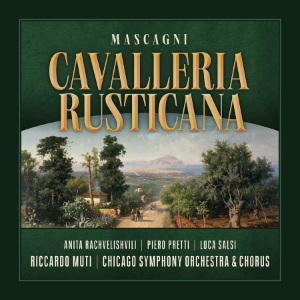
Pietro Mascagni (1863-1945)
Cavalleria rusticana (1890)
Santuzza – Anita Rachvelishvili (mezzo-soprano)
Turiddu – Piero Pretti (tenor)
Alfio – Luca Salsi (baritone)
Lucia – Ronnita Miller (mezzo-soprano)
Lola – Sasha Cooke (mezzo-soprano)
A woman – Alessandra Visconti
Chicago Symphony Orchestra and Chorus/Riccardo Muti
rec. live concert performance, February 2020, Symphony Center, Chicago
Libretto with English and German translations enclosed.
Reviewed as downloaded from press preview.
CSO RESOUND CSOR9012201 [77]
Mascagni’s one-act melodrama Cavalleria rusticana often appears – at least on disc – in harness with its stepbrother Pagliacci. Here, however, it is let loose in full freedom on its own under the Music Director of the Chicago Symphony Orchestra since 2010, Riccardo Muti. Muti is of course an old hand in the operatic repertoire and recorded the twin operas with José Carreras in the tenor lead back in 1979. The CSO is not particularly known as an opera orchestra, even though Solti set down some sets during his sojourn as Music Director, but long ago, during the first years of its existence in the late 19th century, the CSO championed Mascagni. The Intermezzo from Cavalleria was actually programmed in the orchestra’s second concert and on 30 September 1891 Chicago could see a complete Cavalleria, only three weeks after Philadelphia gave the American premiere of the work. The Chicago Tribune wrote: “No event in the history of music in Chicago has been of so great import and given promise of such wide-reaching benefits to music and musicians as does the formation of this orchestra.”
In a way it is also the orchestra that is the main attraction in this performance. The silken string tone, for which the CSO is so famous, sets the tone from the start in the prelude which softly grows to a climax before Turiddu’s voice is heard behind the curtain, and it is the strings that carry the whole first third of the opera, the beautiful choruses, Santuzza’s Voi lo sapete. Actually this opera is among the most lyrical of operas until Turiddu meets Santuzza and sparks begin to fly. – and during the church scene, when the lovely Intermezzo pours oil on the troubled waters, it is again the strings that dominate, and Muti shapes the phrases lovingly. This is not to say that the drama is underplayed – on the contrary, Muti masterminds the conflicting feelings with a sure hand and in the final scene keeps the tension alive, up to the hysterical shouts of Hanno ammazzato compare Turiddu! (Turiddu has been killed!). I have never heard these words executed with such spine-chilling effect, and the woman delivering them, Alessandra Visconti, is rightly listed in the cast list.
Cavalleria rusticana is very much also a choral opera and Chicago Symphony Chorus demonstrates its worth excellently in the lyrical opening chorus as well as the mighty Regina coeli and are well in the picture during the dramatic final scene. But when it comes to the soloists, I must report some misgivings. Neither of the men can measure up against their rivals on competing recordings. Luca Salsi’s Alfio hasn’t got the sap in the voice of a Robert Merrill or Sherrill Milnes and Piero Pretti’s Turiddu has neither the lyrical beauty of Björling and Bergonzi, nor the high-octane ping of Mario Del Monaco. Both are workman-like and reliable in the first half of the opera, which is a qualification in itself, and in the final scene Pretti is transformed and sings with a glow and beauty of tone – and a deep identification with the role. Anita Rachvelishvili’s Santuzza is big-voiced and vibrant, occasionally excessively so, but she has dramatic intensity and grows into the role more and more. She may not quite rival my longstanding favourites Simionato and Cossotto but she certainly is a Santuzza to reckon with. Ronnita Miller sounds younger-than-average as Mamma Lucia, a role often taken by elderly-sounding veterans, and Sasha Cooke sings Lola’s Fior di giaggiolo beautifully, but to my mind, she underplays the sexual allure one expects from this flirtatious girl.
The recording was made live at a concert performance, just before the outbreak of the pandemic, but there are no signs of an audience and there is no applause. The recording is well-balanced, though Turiddu’s off-stage Siciliana might be a mite too close. On the other hand, I have heard recordings where the tenor is almost inaudible, which is a bigger fault.
The orchestral playing and the choral contributions are impressive, the final scene is as spine-chilling as ever and overall, there is high professionalism at work, but for an even more satisfying experience I would opt for Serafin (Decca) with Giulietta Simionato, Mario Del Monaco and Cornell McNeill if I want true blood-and-thunder, and Karajan (DG) with Fiorenza Cossotto, Carlo Bergonzi and Giangiacomo Guelfi when I prefer a more lyrical approach. Both are more than fifty years old and cannot quite compete on sonic grounds, but they are still excellent and wear their years lightly.
Göran Forsling
Help us financially by purchasing from





















